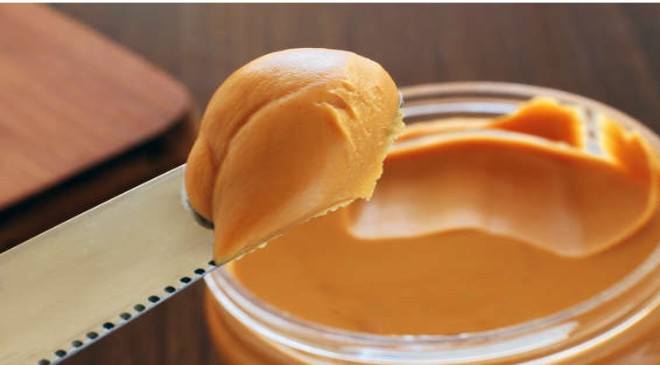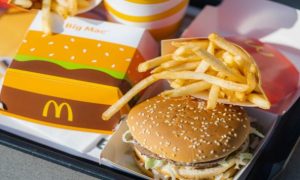Surprising Side Effects of Eating Peanut Butter, Says Science
Peanut butter is a part of many people’s all-time favorite snacks. However, it’s possible that your daily dose of PB could be causing some unfavorable side effects.
Below, we bring just four of these pitfalls to light so you know what to watch out for. And after, don’t miss the 13 Best Peanut Butter Breakfast Ideas!

1. It may cause acid reflux.
Acid reflux is no joke! In a previous article, Trista Best, MPH, RD, LD said, “eating too much peanut butter can lead to the onset or irritation of generalized acid reflux disorder, otherwise known as GERD.”
For context, GERD is a digestive disorder that occurs when acidic stomach juices or food and fluids flow back up into the esophagus from the stomach, causing a burning sensation. It’s also another name for acid reflux.
“Peanut butter is okay for those with GERD, but in moderation, as it is a relatively high-fat food,” she says.
Fatty foods can cause the bundle of muscles that separate your esophagus from your stomach called the lower esophageal sphincter (LES) to relax and allow the backflow of stomach acid to creep back up into your esophagus.

2. You could be consuming unhealthy fats.
Speaking of fatty foods, some peanut butter brands may be sneaking more oils into your peanut butter than usual. Let’s clarify one thing real quick, though. Peanut butter is a great source of healthy monounsaturated and polyunsaturated fatty acids. However, some commercial brands tend to pack in extra oils, like palm oil or fully hydrogenated vegetable oils, into that jar of peanut butter, which contributes saturated fats to your diet.

3. It could be upping your consumption of added sugars.
Some of these same commercial brands adding oils to your peanut butter may also be sneaking added sugars into their products. For example, Peter Pan Natural, Honey Roast, Creamy Peanut & Honey Spread packs 8 grams of sugar per two-tablespoon serving. It’s no wonder registered dietitians ranked it as one of the worst peanut butter options on the market.

4. Peanut butter may contain a dangerous kind of mold.
Oddly enough, peanut butter could contain a carcinogen called aflatoxins found in a mold called Aspergillus. Peanuts grow underground and tend to be colonized by the mold, however, some research has shown that processing peanuts into peanut butter can reduce levels of aflatoxins by as much as 89%. The USDA also monitors foods to make sure they don’t go over recommended limits. Still, it may be worthwhile to know that a few human studies have linked exposure to aflatoxins to liver cancer.









































